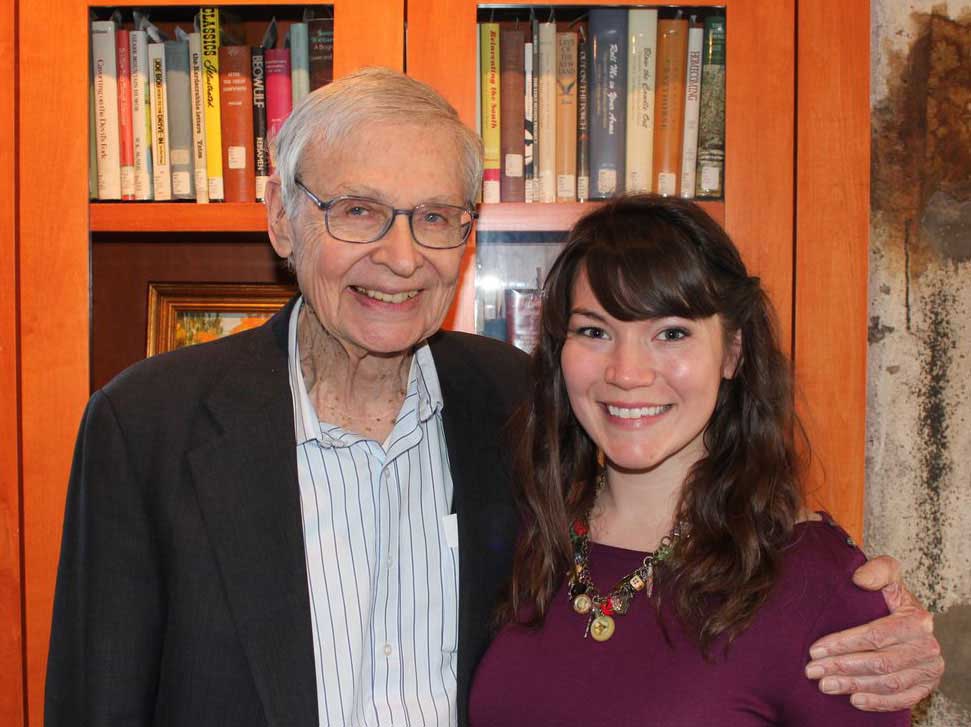Remembering Dr. Cal Ledbetter
Monica Mylonas is an archival assistant at the UALR Center for Arkansas History and Culture. She got to know Dr. Cal Ledbetter through his papers as well as a long conversation about his life, his time in office, and Pikes Peak.
It was an honor to be asked to process Cal Ledbetter’s legislative papers. An honor, but a terrifying one.
Although I was relatively new and had never met Dr. Ledbetter, his reputation preceded him. I knew him to be a gregarious and extremely intelligent man, as well as an important figure in both state and university history. I felt the pressure. But as I would soon learn through my review of his career—and ultimately by meeting with him—I needn’t have worried.
His papers revealed him to be at once a man of passion and of reserve. He was very matter-of-fact; I detected no purple prose in his writings. But his ability to endear himself to anyone was startling. Above all, he was persistent. I found subject-based files that stretched for 10 years, the duration of his tenure in the Arkansas General Assembly. If he believed in something, he apparently fought for it.

My suppositions were confirmed when I finally got to meet Dr. Ledbetter. We had invited him to the center downtown to help identify photographs and to record an interview. My colleagues half-joked that I should bake him some chocolate chip cookies, reportedly his favorite. I took this suggestion to heart and arrived on the morning of the interview with a fresh batch under my arm.
My stomach turned as I waited for him. (As an archivist, you become so absorbed in the life of your subject that you can’t help but become a little star-struck when given the chance to meet him. The one-sidedness of it all is exactly that of the celebrity phenomenon.) But, as I might have guessed, he was so good-natured and open that I felt that I’d known him — really known him, not just archivist-known him — for years. He could have been a favorite former professor. He cannily identified most, if not all, of the photographs I placed before him, and his son, Grainger, was on hand to help. After enjoying a few of the cookies (whew!), he was ready to sit for the interview.
That he is proud to be a Little Rock native is apparent after the first question. This is not a passing pleasantry. One glance at Dr. Ledbetter’s education history will tell you that he could have landed anywhere, but he chose to return to Arkansas and to give back all that he’d been given (and more). Of course, he is self-deprecating throughout. He provides no grandiose response to my question about why he ran for office in the first place, only the following: “You wonder, why did you [run for office]? And you’re never quite sure […] I don’t want to say there wasn’t ego involved, there is ego involved. But I think there was also the idea, I saw some things I could do, some things that probably needed to be changed, and you can best do this through public service.”
Reform was indeed a central tenet of his career. He takes pride in the work accomplished by the constitutional conventions of 1970 and 1980; although the proposed constitutions were rejected by the public, he feels that they laid the groundwork for constitutional reform, which he believes is still imminent. He touts it as the most important issue the assembly faced during his tenure in the legislature.
Finally, when asked if he has anything to add, Dr. Ledbetter shares two stories. In the first, he recounts driving from Miami back to Little Rock on his own at the age of 16. He stopped at hotels and service stations along the way, where he was treated like an adult. He likes to tell the story because it shocks people, but I think he also likes to savor those first feelings of individual agency.
He then relates the experience to Cheley Camp in Colorado, where one summer he pursued mountain climbing. By the end of the summer, his group was able to make it to the summit of Longs Peak. He looked down on Pikes Peak and watched cars wind up the side. He remembers it as a “reinforcing” experience.
Clearly, Dr. Ledbetter valued those formative moments of childhood and early adulthood when he was trusted to accomplish a seemingly Herculean task and would emerge victorious, baptized in newfound confidence and capability. I would expect nothing less from a man who devoted so much of his life to the promotion of higher education—a man who placed so much trust, in every sense of the word, in future generations.